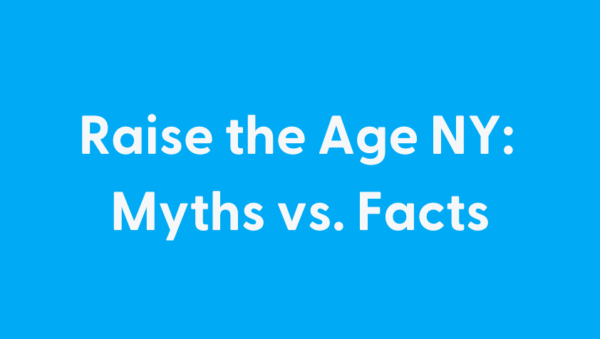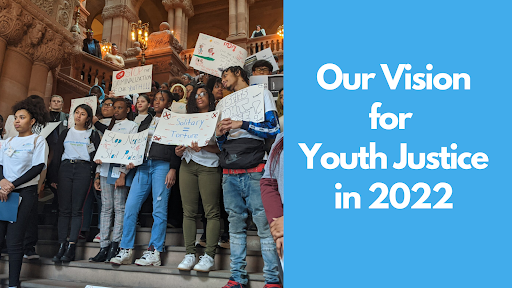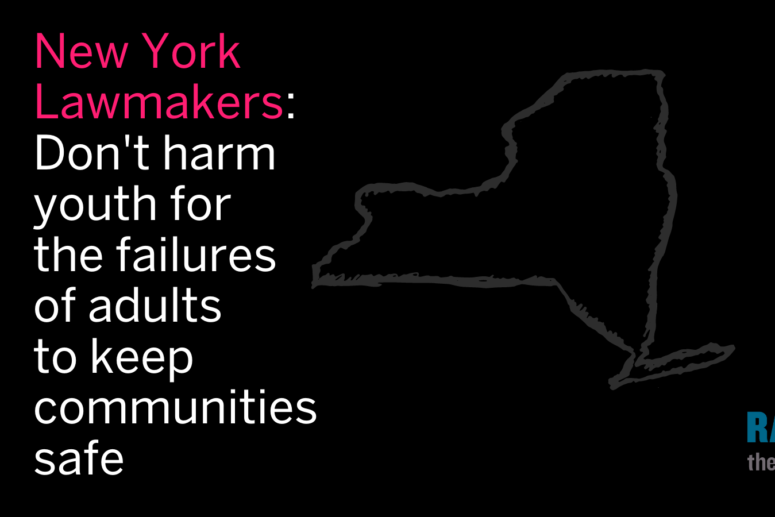January 13, 2022 – In April 2017, the New York State legislature enacted landmark legislation raising the age of automatic adult prosecution in New York to 18. Before that, New York had the shameful distinction of being one of only two states in the country—along with North Carolina—to charge all 16- and 17- year-olds in adult criminal court, subjecting teenagers who were not eligible to vote to permanent criminal records and adult prison sentences.
After the Raise the Age law went into effect in 2018, arrests and incarceration of 16-and 17-year-olds declined while crime remained the lowest it has been in New York in decades. Nevertheless, some have falsely blamed these long-overdue reforms for the recent increase in gun violence in New York. This document sets the record straight by covering some Myths and Facts about Raise the Age in NY.
Myth: Raise the Age reforms have caused an increase in gun violence among youth.
Fact: During the first eighteen months of the Raise the Age law, shootings in New York City remained the lowest they have been in decades, even as arrests and incarceration of 16- and 17-year-olds declined. Only after months of COVID-19 infections, deaths, and lockdowns, did gun violence increase in New York City, as it did in many cities around the country where criminal justice reforms had not been enacted. And while we must address this recent rise as part of community recovery from the COVID crisis, it is important to recognize that the numbers are still far lower than the rates of gun violence in 2000, when 16- and 17-year-olds were all prosecuted as adults for all criminal charges, even the most minor.
Myth: Under Raise the Age, all teenagers are tried in family court, even for the most serious offenses.
Fact: Under Raise the Age, all felony cases against all 16- and 17-year-olds are filed in the adult criminal courts. If the judge in the case finds that the young person is accused of causing significant physical injury, displaying a deadly weapon, or engaging in any sexual offense—or if the judge finds any other “extraordinary circumstances”—the case remains in adult court, where adult sentencing applies.
Myth: Because of Raise the Age, all teenagers arrested with guns are sent to family court.
Fact: Under the Raise the Age law, any case involving display of a firearm or other deadly weapon is tried in adult court. When a 16- or 17-year old is charged with possessing but not displaying a gun–or any other felony offense—the prosecutor always can always file a motion arguing that the teenager should be tried as an adult. The judge can consider a wide range of factors such as: the young person’s past criminal history, including open and closed cases; suspected gang involvement; the extent of the harm caused; and whether the young person is a good candidate to benefit from services in family court.
Myth: When a case is removed to family court, a teenager faces no consequences or accountability.
Fact: Going to family court is not a “get out of jail free” card and does not mean that a teenager will avoid detention or placement or be free of court supervision. Family court uses a range of tools including probation supervision and intensive case management, mandated family and individual counseling, and detention and long-term placement in a residential facility. In some cases, family court mandates are more intensive than those in adult court.
Myth: More severe adult criminal penalties for adolescents will decrease gun violence.
Fact: New York spent decades treating children as adults in the criminal courts with no correlation to reduced crimes rates. Gun violence is an economic justice issue. We can’t incarcerate our way out of it—that has been tried and failed. Our young people, families, and communities need safe and stable housing; green spaces; high-quality education and vocational programs; accessible and culturally competent health and mental health services; youth engagement programs; living wage jobs; and programs that address gun violence as the public health issue that it is.


